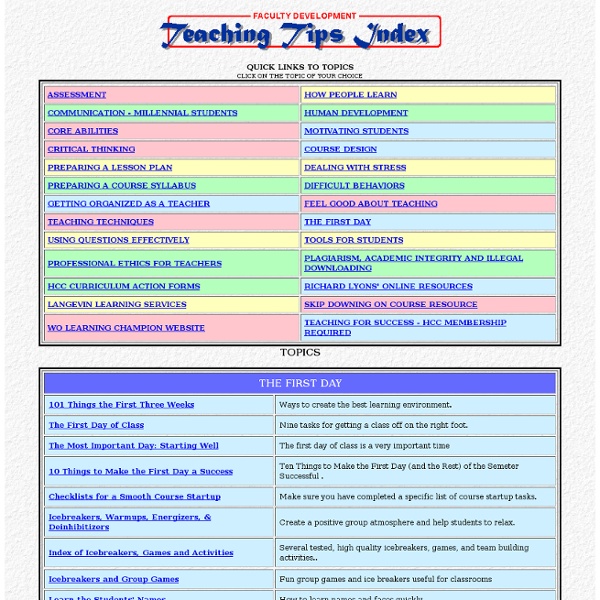



The Core Rules of Netiquette -- Excerpted from Netiquette by Virginia Shea -- Albion.com The Core Rules of Netiquette are excerpted from the book Netiquette by Virginia Shea. Click on each rule for elaboration. Introduction Rule 1: Remember the Human Rule 2: Adhere to the same standards of behavior online that you follow in real life Rule 3: Know where you are in cyberspace Rule 4: Respect other people's time and bandwidth Rule 5: Make yourself look good online Rule 6: Share expert knowledge Rule 7: Help keep flame wars under control Rule 8: Respect other people's privacy Rule 9: Don't abuse your power Rule 10: Be forgiving of other people's mistakes Next page ...Previous page ...Core Rules ...Netiquette Contents
Chicago-Area Independent Schools JOLT - Journal of Online Learning and Teaching Introduction An ordinary function of any class, online or otherwise, is to teach and engage the students. Research on online education consistently finds that high and consistent interaction levels between students and the professor, and high interaction levels between the students themselves, is often seen as a positive variable (Hammond, 2005; Johnson, Aragon, Shaik, & Palmas-Rivas, 2000; Berge & Collins, 1996; Tu, 2000; Muirhead, 2001; Blignaut & Trollip, 2003; Vonderwell, 2003). Most online instructors, aware of how important student participation is to online learning, will realize that s/he must produce solid educational discussion questions that also engage; as Hunkins (1989) stated, "Questions and thought coexist" (p. 17). An online instructor should also be aware of the research that demonstrates that teaching online takes more time and more effort, especially due to the need to provide individualized attention (Cavanaugh, 2005; Stern, 2004). C: Cognitive Nature Textbook Based
edrsch Wilerson, L. and Gijselaers, W.H., Bringing Problem Based Learning to Higher Education: Theory and Practice, New Directions for Teaching and Learning, No. 68, Winter 1996. "Let Problems Drive the Learning" ASEE Prism (staff article), 30-36, October 1996. Woods, Don, Problem-Based LearningL How to Get the Most From PBL, McMaster University, 1996. Woods, Hrymak, Marshall, Wood, Crowe, Hoffman, Wright, Taylor, Woodhouse, and Bouchard, "Developing Problem Solving Skills: The McMaster Problem Solving Program," Journal of Engineering Education, 86(2), 75-92, April 1997. Norman, G.R., & Schmidt, H.G., "The psychological basis of problem-based learning: A review of the evidence," Academic Medicine, 67(9), pp. 557-565, September 1992. Stepien, W., & Gallagher, S., "Problem-Based Learning: As authentic as it gets," Educational Leadership," pp. 25-28, April 1993. American Association For the Advancement of Science, Science for all Americans, New York: Oxford University Press, 1990. Resources: PBL in K-12
Please don't call me professor [an error occurred while processing this directive] January 4–11, 1996 slant A young college prof attempts to get down with his students, dude. By Jason Wilson "I went to see Hole last night," I said. "I went to see Hole last night," I repeated. It was a true story. The girls in the back row gave me fake smiles. "No," I said. I rolled down my sleeve and gathered my notes on Writing the Process Analysis Essay. Then, like a damned fool, I passed them out. I was teaching college freshmen for the first time and I was really, honestly trying to bond with my students. I was severely misguided, to say the least. Each time I protested, "I'm Jason, dude. Linda sat up straight and said, "Eeeeww, my last boyfriend was 24. I tried to gain credibility and acceptance by virtue of the teaching materials I used. They didn't catch references to Atari "Combat." Jessica was the only one in the class who shook her head knowingly, "Oh yeah, Pop Rocks. More laughter ensued from the class.
Welcome to Berkeley Lab's Center for Science & Engineering Education ScienceMaster.com - Learning Science Just Got Easier Creativity techniques and creative tools for problem solving This A to Z of Creativity and Innovation Techniques, provides an introduction to a range of tools and techniques for both idea generation (Creativity) and converting those ideas into reality (Innovation). Like most tools these techniques all have their good and bad points. I like to think of these creativity and innovation techniques as tools in a toolbox in much the same way as my toolbox at home for DIY. It has a saw, spanner, hammer, knife and all sorts of other things in it, they are all very useful, but you have to pick the right tool (creativity / Innovation technique) for each job. This site will try and provide a little guidance along with each tool to let you know whether it's best used for cutting paper or putting in nails. For the future, the aim is to also have sub-categories which will identify Techniques for; Problem Definition - including problem analysis, redifinition, and all aspects associated with defining the problem clearly. Subcategories